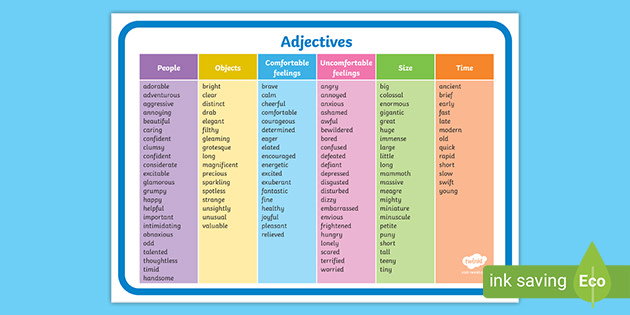How Adjectives - TIP Sheets - Butte College can Save You Time, Stress, and Money.

Some Ideas on Adjectives in English -Words That Modify or Describe Nouns You Should Know
Adjective use advice We'll end with a few words about adjectives and design. It's something to understand how to use an adjective; it's another to understand when using one is an excellent idea. Excellent writing is exact and succinct. Sometimes, you need an adjective to communicate exactly what you mean.
Is it a big home, or is it a mansion? A large crowd, or a crowd? A mixed-breed canine, or a pooch? A dark night, or just. night? Always remember to make every word count in your writing. If you need an adjective, use it. However if it's not pulling its weight, delete it.

Detailed words like "stunning," "smooth," or "heavy" are all adjectives, as are numbers (" twelve eggs"). Adjectives modify nouns, while adverbs customize adjectives and other adverbs. For Research It Here , in the expression "uproarious motion picture," funny is an adjective explaining the noun motion picture, and really is an adverb explaining the adjective funny.

Alternative Adjectives Vocabulary Grid (Teacher-Made)
Just adverbs can customize other adverbs.

List of Adjectives: 300 Useful Adjectives Examples from A to Z with Exercises - ESL Grammar

What are Adjectives? Definition, Types, Usage with Examples - English as a Second Language
Not known Details About List of 228 Common Adjectives - YourDictionary
Part of speech that describes a noun or pronoun In linguistics, an adjective (abbreviated) is a word that customizes a noun or noun expression or describes its referent. Its semantic function is to change info provided by the noun. Traditionally, adjectives were thought about one of the main parts of speech of the English language, although historically they were classed together with nouns.
Some examples: Etymology [modify] Adjective originates from Latin, a calque of Ancient Greek:, romanized:, 'additional noun' (whence also English ). In the grammatical tradition of Latin and Greek, due to the fact that adjectives were inflected for gender, number, and case like nouns (a procedure called declension), they were thought about a kind of noun.
The terms noun substantive and noun adjective were previously utilized in English however are now outdated. Kinds of usage [edit] Depending upon the language, an adjective can precede a corresponding noun on a prepositive basis or it can follow a corresponding noun on a postpositive basis. Structural, contextual, and design considerations can strike the pre-or post-position of an adjective in an offered circumstances of its incident.
